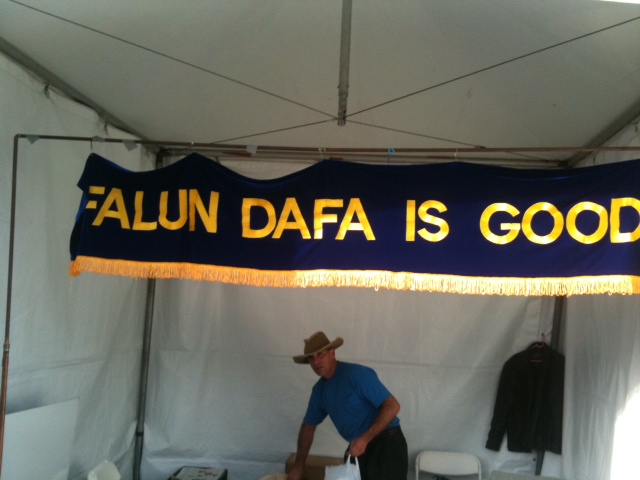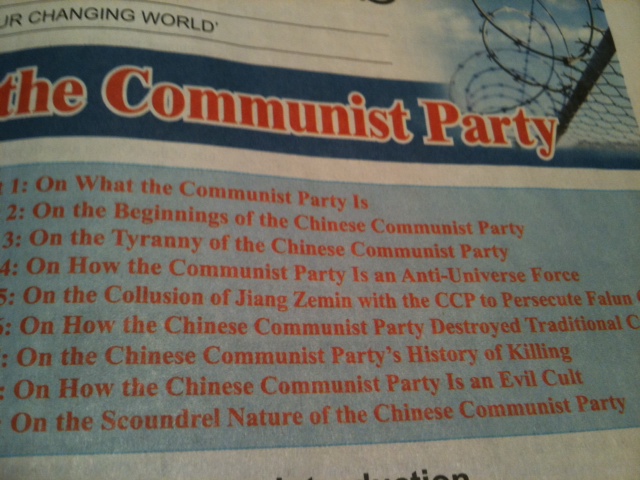
I volunteered to help at an annual Phoenix event today, “Phoenix Chinese Week,” which is like an outdoor trade show for local companies to reach out to the Chinese community, to sell their Chinese wares, offer Chinese massage and acupuncture, serve up Chinese food, etc. There are also fashion shows and demonstrations of Chinese calligraphy. I loved it. It was the first time since I moved back to Phoenix that I was able to practice my Chinese for hours at a time.
Phoenix Chinese Week is held at the Phoenix Cultural Center, a huge complex housing a Chinese supermarket, a number of Chinese restaurants and a lot of office space, much of it unoccupied. The money-losing COFCO center is closely affiliated with the CCP, which helps it survive with generous funding.
So it caught my eye when I saw a booth for the Falun Dafa, with their usual battery of literature, including a “special edition” of the Epoch Times, which seemed even more over the top than usual.


I stopped by and chatted with the staff at the booth, who seemed very nice, though they didn’t seem to be very busy. Many of the attendees were from Mainland China, and they tended to steer clear. I just wondered how the Chinese Cultural Center felt about the Falun Dafa’s presence on what is for all intents and purposes CCP territory. This isn’t China, however, and I’m guessing there was little the Center could do about it. You can’t discriminate based on religion.
I might be more sympathetic to the Falun Dafa if their materials and methodology weren’t so extreme. I think they’re a cult, but then again, I think Mormonism and the Republican Party and several sects of Christianity qualify as cults, too. I can never accept the argument that the CCP’s treatment of them is justified because they’re “a dangerous cult” (another well-drilled message nearly all Chinese people I’ve met adhere to, as they do to the message, for example, of “the Dalai Lama clique”). That said, I find them singularly distasteful, even though I don’t think they should be beaten, tortured or discriminated against.
This is another of those topics I learned long ago never to discuss with my Chinese friends. It is simply impossible to have a rational discussion about Falun Dafa. It’s impossible to make the argument that even if they are a cult, they should have a right to exist. Creepiness is not a crime.
(All photos taken, poorly, on my iPhone.)
Update: To better understand how I feel about the Falun Dafa, I want to refer readers to this earlier post.
The scripts for FLG are… predictable: their leader is a lunatic who believes, among other things, that he can fly. They don’t allow practitioners to see a doctor when they’re sick, causing a terrible threat of disease and loss of life. They recruit and multiply and they can’t be trusted. Of course, the No. 1 script is the “dangerous cult,” a phrase that has been permanently soldered onto the words Falun Gong and can be heard in virtually every conversation with Chinese people about it.
I’ve always believed the cult part, and I’ve never believed the dangerous part. I would see FLG members practicing their breathing exercises outside the National Museum in Taibei, and while they may have looked odd they certainly didn’t seem to be threatening anyone. In Country Driving, Peter Hessler describes how the family he shadows in Book Two participated in the dangerous cult before it was banned:
Falun Gong was hard to define. – in some ways it felt like a religion or philosophy, but it was also a basic exercise routine. All of these elements combined to create something enormously popular, and this was especially true in the economically challenged parts of northern China. In Sancha, practitioners liked having a new structure to their lives, and soon others began to join them. By the late 1990s, it seemed most villagers met every morning on the lot at the top of the dead-end road. Cao Chunmei and Wei Ziqi became part of the faithful, and years later she described that period fondly. “Wei Ziqi didn’t drink or smoke in those days, because Falun Gong says you shouldn’t do that. And he was so angry then. It seemed the people in the village were happy we all spent time together in the morning.
I can think of other things that sound a bit more dangerous than that.
So again, I want to be sure it’s clear, I am not anti-Falun Dafa, even though I find the propaganda and methodology of its zealots (as in the photos from Epoch Times above) to be unappealing. I think most of its practitioners are normal, decent human beings who have a right to practice as they choose.
Comments